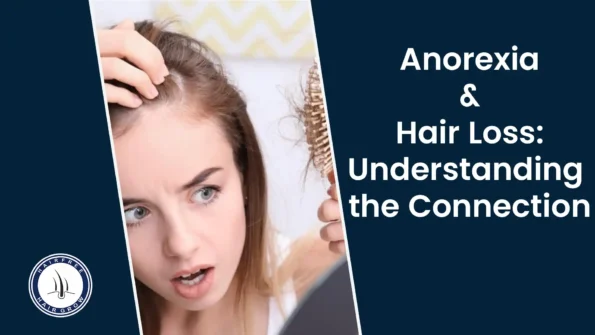Anorexia is a serious eating disorder that affects both physical and mental health. One of its many effects is hair loss, which can be distressing for those already struggling with body image issues. In this blog, we’ll explore how anorexia causes hair loss, why it happens, and what can be done for recovery.
How Does Anorexia Cause Hair Loss?
Anorexia leads to severe nutrient deficiencies that affect hair growth. The body goes into survival mode, prioritizing vital organs like the heart and brain over non-essential functions such as hair growth. As a result, the hair becomes weak, thin, and starts falling out.
Here’s how anorexia and hair loss are linked:
- Lack of Protein – Hair is made of keratin, a type of protein. Without enough protein, hair becomes brittle and falls out.
- Iron Deficiency – Low iron levels reduce oxygen supply to hair follicles, causing shedding.
- Hormonal Imbalance – Anorexia disrupts hormones, leading to anorexia hair thinning and slowed hair regrowth.
- Vitamin Deficiencies – Lack of vitamins like biotin and zinc weakens hair structure.
- Extreme Weight Loss – Rapid weight loss causes telogen effluvium, a condition where hair enters a resting phase and sheds excessively.
Signs of Hair Loss Due to Anorexia
If you or someone you know is experiencing hair loss due to anorexia, watch for these signs:
- Hair becoming thin, brittle, and dry
- Increased shedding while brushing or washing hair
- Bald patches or noticeable scalp visibility
- Growth of lanugo hair (fine body hair that appears due to extreme weight loss)
Hair Loss Recovery After Anorexia
The good news is that hair loss due to anorexia is often reversible with proper nutrition and treatment. However, it takes time and requires consistent effort. Below are some key steps for hair recovery:
1. Proper Nutrition
Eating a balanced diet rich in proteins, vitamins, and minerals is the most important factor in hair regrowth. Since anorexia deprives the body of essential nutrients, replenishing them is crucial.
Nutrient | Role in Hair Growth | Sources |
Protein | Builds hair structure | Eggs, fish, lentils |
Iron | Prevents shedding | Spinach, red meat, nuts |
Biotin | Strengthens hair | Nuts, whole grains, bananas |
Zinc | Supports scalp health | Pumpkin seeds, chickpeas |
Vitamin D | Promotes new growth | Sunlight, dairy products |
Omega-3 Fatty Acids | Keeps hair hydrated | Salmon, flaxseeds, walnuts |
Some people recovering from anorexia may struggle with eating full meals. In such cases, small, nutrient-dense snacks can help. Protein shakes, smoothies, and meal replacement bars can provide essential nutrients without overwhelming the digestive system.
2. Managing Stress
Stress and anxiety worsen hair loss. When the body is under stress, it releases cortisol, a hormone that can disrupt the hair growth cycle. People recovering from anorexia may experience additional stress due to weight gain fears or body image issues, which can further delay hair regrowth.
Some ways to manage stress for better hair recovery:
- Meditation and Yoga – Help calm the mind and improve blood circulation.
- Deep Breathing Exercises – Reduce anxiety levels.
- Journaling – Writing about emotions can provide clarity and reduce stress.
- Counseling or Therapy – Can help address eating disorders and stress-related hair loss.
3. Hydration and Scalp Care
Hair health depends on hydration, both internally and externally. Dehydration can make hair brittle and prone to breakage. It’s recommended to drink at least 2–3 liters of water daily.
In addition to drinking enough water, proper scalp care is essential:
- Use sulfate-free shampoos to prevent dryness.
- Avoid excessive heat styling, hair dyeing, and chemical treatments.
- Massage the scalp with natural oils like coconut, castor, or argan oil to improve blood circulation.
- Use aloe vera or onion juice as a natural remedy to promote hair growth.
4. Seeking Professional Help
Recovering from anorexia and hair loss requires a multidisciplinary approach. A doctor, nutritionist, or therapist can help with:
- Developing a meal plan that restores lost nutrients.
- Monitoring vitamin and mineral levels to check for deficiencies.
- Providing mental health support to overcome eating disorder habits.
Some people may require supplements like iron, biotin, or vitamin D if deficiencies are severe. However, these should be taken only under medical supervision to prevent overdosing.
5. Hair Growth Treatments
If hair loss is severe and natural regrowth is slow, some medical treatments may help speed up recovery:
- Minoxidil (Rogaine) – A topical solution that stimulates hair follicles.
- Platelet-Rich Plasma (PRP) Therapy – Uses plasma from your blood to promote hair regrowth.
- Low-Level Laser Therapy (LLLT) – A painless procedure that improves blood circulation to hair follicles.
- Hair Transplant – For extreme cases where hair follicles are permanently damaged.
While medical treatments can help, they work best when combined with proper nutrition and lifestyle changes.
FAQs About Anorexia and Hair Loss
1. Does anorexia cause permanent hair loss?
Not necessarily. In most cases, hair loss due to anorexia is temporary. Once the body receives proper nutrition and recovers from malnourishment, hair usually starts growing back within a few months. However, if anorexia has persisted for many years, hair follicles may become permanently damaged, leading to irreversible hair loss. Seeking treatment early increases the chances of full hair recovery.
2. How long does it take for hair to grow back after anorexia?
Hair regrowth varies from person to person. Typically, 3 to 6 months after proper nutrition and treatment, people start noticing an improvement. However, it may take a year or more for full regrowth. The speed of recovery depends on factors like overall health, stress levels, and the severity of anorexia.
3. Can eating disorders cause bald spots?
Yes, severe malnutrition can cause bald patches due to extreme hair shedding. This condition is called telogen effluvium, where large amounts of hair enter the resting phase and fall out. Bald spots may improve over time with proper nutrition, but in some cases, additional treatments like PRP therapy or minoxidil may be needed.
4. Will taking supplements help with hair loss recovery after anorexia?
Yes, but supplements alone are not enough. While biotin, zinc, and iron can support hair regrowth, they should be combined with a balanced diet for the best results. Always consult a doctor before taking supplements to avoid any negative effects.
5. Can stress make anorexia-related hair loss worse?
Yes. High stress levels disrupt the body’s natural functions, including hair growth. Stress causes hormonal imbalances, leading to increased shedding and slowed regrowth. Managing stress through meditation, therapy, and self-care practices can significantly improve hair recovery.
Conclusion
Hair loss due to anorexia can be scary and frustrating, but recovery is possible with the right approach. Prioritizing a healthy diet, stress management, hydration, and professional treatment can help restore hair growth over time.
If you’re struggling with anorexia and hair loss, don’t hesitate to seek medical advice. Remember, hair regrowth is a sign of overall health improvement—so focus on healing your body first.
Need expert advice on hair regrowth?
Visit Hairfree & Hairgrow Clinic for professional hair restoration solutions.
At Hairfree & Hairgrow Clinic, we specialize in advanced hair restoration solutions, including medical treatments, PRP therapy, and customized care plans tailored to your needs. Our expert team is dedicated to helping you restore healthy, natural-looking hair with the latest techniques and treatments.
Written By
MD (Skin & VD)
Dr. Richa Sanmukhani is a renowned hair restoration specialist with expertise in anorexia and hair loss. She provides comprehensive care, helping patients understand the connection between anorexia and hair loss while offering effective solutions for hair restoration and overall health.
Disclaimer
We’ve made all possible efforts to ensure that the information provided here is accurate, up-to-date and complete, however, it should not be treated as a substitute for professional medical advice, diagnosis or treatment. See Detailed Disclaimers Here.


